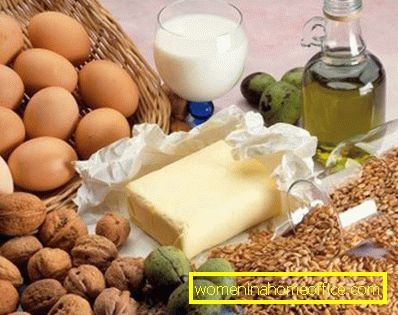Iodine in food
Iodine is a valuable mineral that is vital for the body. In a huge amount, it accumulates in seafood of animal and vegetable origin, which are natural sources of iodine.

Nutrition and the environment have a huge impact on human health. Every sane person seeks to reduce the influence of adverse factors on your body.
The nature of our country itself does not contain enough iodine, plus a bad environment. Reducing the quality of products, chemical processing reduces the content of this trace element in food. You also need to avoid heat treatment of products, it reduces the content of iodine in them.
Iodine deficiency in the body leads to the following consequences.
- Diseases of the thyroid gland (endemic goiter). This disease can slow down the physical and mental development of the child, leading to cretinism, sexual dysfunction.
- Hypertension.
- Atherosclerosis.
- Immunity decreases.
- Metabolic disease.
Completely fill the iodine deficiency from food is impossible, but it is necessary to include in your diet, containing iodine. With products, a person gets ½ of iodine needed by the body. In conventional foods, trace elements are found in small doses, but there are leaders.
Iodine in food
- Sea kale and other seaweed. Since ancient times, kelp has been used to combat many diseases. Seaweed is growing in the Pacific and Arctic oceans. In addition to iodine, sea kale is rich in proteins and saturated amino acids. If you use sea kale constantly, the body will gradually fill the iodine deficiency and restore strength and vigor.
- Apple seeds.
- Sea fish: herring, tuna, salmon, perch, cod (especially cod liver), etc. If you eat 200 grams. cod per day, then this is enough to saturate the body with iodine.
- Fish fat. The presence of fish oil in the diet is the prevention of rickets and a source of iodine.
- Sea Nuts: crabs, shrimps, squids and other marine inhabitants. However, do not assume that including fish and seafood in your diet can avoid iodine deficiency. If you do not live by the sea and fish is not the main product of your food, then there is no guarantee that iodine is enough in your body.
- Oats
- Champignon.
- Products enriched with iodine: salt, bread, milk.

The following foods contain less iodine.
- Freshwater fish.
- Cereals.
- Milk.
- Egg.
- Butter.
- Webbing walnuts.
- Feijoa fruit
- Beef.
- Vegetables that are grown on soils rich in iodine.
Do not eat foods containing iodine with plenty of cabbage, corn, beans, soy. These products can cause thyroid disease and increase the body's need for iodine.
It is impossible to rely only on food, because you have to change your diet, spend a lot of money. Using the iodine diet is very difficult to accurately determine the dosage of the microelement, because different degrees of heat treatment affects the amount of the microelement differently.
Iodine in food is contained in various percentages, depending on the region of growth of a product, and how much iodine enters the product from the soil.
200 mg of iodine should be eaten per day, but during pregnancy the rate of the trace element doubles. In this regard, iodine-containing preparations will help to replenish the reserves of iodine in the body. But here it should be noted that both iodine deficiency and its excess are dangerous for the body. Do not take these drugs without consulting a specialist.